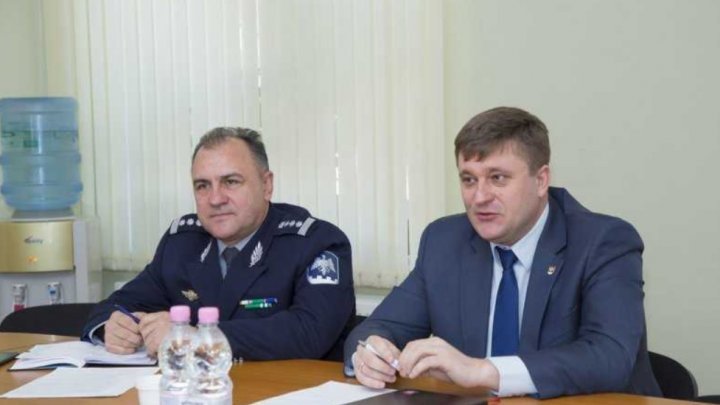Deputy director of Border police held meeting with Naida Chamilova, official of United National for Drugs and Criminality
 foto: PUBLIKA.MD
foto: PUBLIKA.MD
Border Police Deputy Head Valentin Fiodorov proposed extending the area of activity of the Joint Container Control Unit by serving several crossing points during a meeting with the UNODC Regional Coordinator, Naida Chamilova.
The talks took place yesterday, March 13, at the headquarters of the General Inspectorate of Border Police.
The officials approached aspects of bilateral cooperation with a view to obtain a positive response to the operational challenges and needs and the work of the Joint Container Control Unit (CCU) in the Giurgiulesti Free International Port, where border guards and representatives Customs Service.
Valentin Fiodorov reiterated the importance of extending the area of activity of the UCC to the service of other crossing points by equipping them with modern techniques for detecting drugs and continuing training of representatives of the relevant institutions involved in the prevention and fight against illicit trafficking of drugs and weapons through use of containers.
The first step in this direction would be the location of the central office at central level to strengthen institutional capacity.
At the same time, the necessary activities for the development of the actions and the realization of the common objectives were discussed. In this respect, Naida Chamilova has confirmed UNODC's support, through which measures will be taken to develop international cooperation and, in particular, with similar institutions in the Black Sea region.
Publika.md recalls that the Container Control Program is the first of its kind implemented in the Republic of Moldova, being a joint project of the UNODC and the World Customs Organization (WCO) to prevent and combat illicit trafficking in drugs, arms and other smuggling goods . This program was accepted by the Memorandum of Understanding between the United Nations Border Police and the Customs Service of the Republic of Moldova, signed in Vienna on 16 December 2014.
Such programs are implemented by UNODC in more than 20 states of the world, in the Eastern and Caucasus regions, the project being operational in Georgia, and early in Ukraine and Armenia.
The talks took place yesterday, March 13, at the headquarters of the General Inspectorate of Border Police.
The officials approached aspects of bilateral cooperation with a view to obtain a positive response to the operational challenges and needs and the work of the Joint Container Control Unit (CCU) in the Giurgiulesti Free International Port, where border guards and representatives Customs Service.
Valentin Fiodorov reiterated the importance of extending the area of activity of the UCC to the service of other crossing points by equipping them with modern techniques for detecting drugs and continuing training of representatives of the relevant institutions involved in the prevention and fight against illicit trafficking of drugs and weapons through use of containers.
The first step in this direction would be the location of the central office at central level to strengthen institutional capacity.
At the same time, the necessary activities for the development of the actions and the realization of the common objectives were discussed. In this respect, Naida Chamilova has confirmed UNODC's support, through which measures will be taken to develop international cooperation and, in particular, with similar institutions in the Black Sea region.
Publika.md recalls that the Container Control Program is the first of its kind implemented in the Republic of Moldova, being a joint project of the UNODC and the World Customs Organization (WCO) to prevent and combat illicit trafficking in drugs, arms and other smuggling goods . This program was accepted by the Memorandum of Understanding between the United Nations Border Police and the Customs Service of the Republic of Moldova, signed in Vienna on 16 December 2014.
Such programs are implemented by UNODC in more than 20 states of the world, in the Eastern and Caucasus regions, the project being operational in Georgia, and early in Ukraine and Armenia.